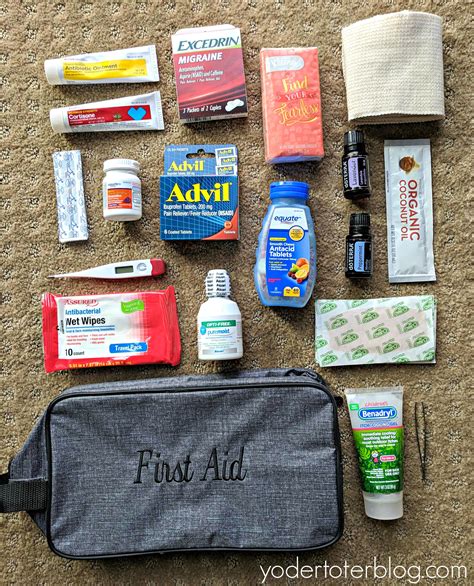Travel Medicine Kit Essentials

Introduction to Travel Medicine Kits
When venturing into the unknown, whether it’s a short trip across the border or an extended journey to a foreign land, having the right tools can make all the difference. A well-prepared travel medicine kit is not just a collection of supplies; it’s a safeguard against unforeseen medical emergencies. This kit can help you treat minor ailments, prevent the spread of illnesses, and even save lives in critical situations. The importance of a travel medicine kit cannot be overstated, especially when traveling to areas with limited medical facilities or where certain diseases are prevalent.
Essential Items for a Travel Medicine Kit
A travel medicine kit should be tailored to the individual’s health needs, the destination, and the type of travel (e.g., backpacking, luxury cruise). However, there are certain essentials that should be included in every kit: - First Aid Supplies: Bandages, band-aids, antiseptic wipes, scissors, tweezers, and a first aid manual. - Pain Relievers and Antihistamines: Over-the-counter pain relievers like acetaminophen or ibuprofen, and antihistamines for allergic reactions. - Antibiotics and Antidiarrheal Medications: Depending on your doctor’s advice, these can be crucial for treating bacterial infections and severe diarrhea. - Personal Medications: Any prescription medications you’re currently taking, along with copies of your prescriptions. - Mosquito Repellent and Insect Sting Relief: To prevent and treat insect bites, which can transmit diseases like malaria, Zika, and dengue fever. - Hydration and Water Purification Tablets/Filter: Especially important if you’re unsure of the water quality at your destination. - Medical Tape and Gauze: For securing bandages and dressing wounds.
Additional Considerations for Travelers
Beyond the basic medical supplies, there are several other factors to consider when preparing your travel medicine kit: - Vaccinations: Research the necessary vaccinations for your destination and make sure you’re up to date. - Prescription Medications: If you have specific medical needs, consult with your doctor about obtaining a travel health kit that includes prescription medications tailored to your health requirements. - Malaria Prophylaxis: If traveling to areas where malaria is common, consult your doctor about the appropriate prophylactic medication. - Altitude Sickness Prevention: If your travels take you to high-altitude areas, consider including medication to prevent altitude sickness.
Preparing for Different Types of Travel
The contents of your travel medicine kit can vary significantly depending on the nature of your travel. For example: - Backpacking: Lightweight, compact kits with essentials for treating blisters, wounds, and potentially altitude sickness. - Family Travel: Include items suitable for all ages, such as children’s pain relievers and any medications required by family members. - Adventure Travel: Consider including supplies for specific activities, such as snake bite kits for desert travel or water purification tablets for wilderness adventures.
🚑 Note: Always check the expiration dates of your medications and supplies, and replace them as necessary to ensure your kit remains effective.
International Travel Considerations
When traveling abroad, it’s essential to be aware of local health concerns and regulations: - Customs Restrictions: Some medications and medical devices may be restricted or require special documentation. - Language Barriers: Consider including a translation of your medical conditions and emergency contacts. - Access to Medical Care: Research the quality and accessibility of medical care at your destination and consider purchasing travel insurance that covers medical emergencies.
| Item | Description | Quantity |
|---|---|---|
| Band-Aids | For minor cuts and scrapes | 10-20 |
| Antiseptic Wipes | For cleaning wounds | 20-30 |
| Pain Relievers | For headaches, fever, etc. | 20-30 tablets |
As you prepare for your journey, remember that a travel medicine kit is a personal and dynamic collection of supplies. It should reflect your specific health needs, the nature of your travel, and the risks associated with your destination. By being well-prepared, you can focus on enjoying your travels, knowing you’re equipped to handle any medical situation that may arise.
To summarize, the key to a successful and healthy trip lies in preparation. Understanding what to include in your travel medicine kit, considering the specific needs of your journey, and staying informed about health risks at your destination are crucial steps. Whether you’re a seasoned traveler or embarking on your first adventure, a well-stocked travel medicine kit is your first line of defense against illness and injury, ensuring your travels are both enjoyable and safe.
What are the most important items to include in a travel medicine kit?
+
The most critical items include first aid supplies, pain relievers, antihistamines, personal medications, and any medications prescribed by your doctor for travel-related illnesses.
How do I determine what medications to include in my travel medicine kit?
+
Consult with your healthcare provider to determine the necessary medications based on your health status, the length of your trip, and your destination. They can provide guidance on over-the-counter and prescription medications.
Are there any specific considerations for traveling to high-risk areas?
+
Yes, areas with high risks of certain diseases (like malaria, Zika, or dengue fever) require special preparations, including prophylactic medications and insect repellents. Always research the health risks associated with your destination and consult your doctor for personalized advice.